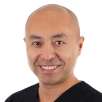STOCKHOLM, Sweden: Understanding of cell types and the mechanisms of dental growth is essential for the reconstruction and engineering of teeth. Therefore, researchers from Karolinska Institutet in Stockholm have investigated the cellular composition of growing and non-growing mouse and human teeth. They believe that the new data on the cellular make-up and growth of teeth could accelerate developments in regenerative dentistry and in the treatment of tooth sensitivity.
Even though major tooth cell types have long been identified, the spectrum of various tooth cells and stem cells, their differentiation, and the interactions that enable tooth growth remain poorly understood. Teeth develop through a complex process in which soft tissue, with connective tissue, nerves and blood vessels, is bonded with three different types of hard tissue into a functional body part.
In contrast to humans, whose teeth are completed before adulthood, mice and many other species have teeth which continue to grow throughout life. The incisor stem cell population in mice continuously self-renews and replenishes tissue that is lost owing to gnawing, making this model attractive for studies of stem cell generation, cell differentiation and injury-induced regeneration.
Mapping of dental cell populations
Using a single-cell RNA sequencing method and genetic tracing, the researchers examined the characteristics of growing mice incisors, compared them with non-growing mice molars and evaluated the extent to which the mouse model reflects the growth of human teeth. In this manner, the researchers at Karolinska Institutet, in collaboration with the Medical University of Vienna in Austria and Harvard University in the US, identified and characterised all cell populations in mouse teeth, in young growing human teeth and in adult human teeth.
“From stem cells to the completely differentiated adult cells we were able to decipher the differentiation pathways of odontoblasts, which give rise to dentine […] and ameloblasts, which give rise to the enamel,” said the study’s senior author, Dr Igor Adameyko, senior researcher in the Department of Physiology and Pharmacology at Karolinska Institutet, and co-author Dr Kaj Fried, senior professor in the Department of Neuroscience at Karolinska Institutet, in a press release. According to them, they also discovered new cell types and cell layers which may play a role in tooth sensitivity.
In addition, the findings might explain complex aspects of the immune system in teeth and help in understanding the formation of tooth enamel. “We hope and believe that our work can form the basis of new approaches to tomorrow’s dentistry. Specifically, it can expedite the fast-expanding field of regenerative dentistry,” added the authors.
The study, titled “Dental cell type atlas reveals stem and differentiated cell types in mouse and human teeth”, was published online on 23 September 2020 in Nature Communications.
Tags:
SEATTLE, US: Murine models have been instrumental in studying tooth development; however, significant differences in tooth shape, number of cusps, and the ...
BOSTON, U.S.: Root canal therapy and the materials and techniques used to perform them are continually evolving. However, the fact remains that after the ...
PORTLAND, Ore., USA: Researchers at the Oregon Health and Science University (OHSU) have developed a revolutionary process by which to engineer new blood ...
LONDON, UK: Though teething is a difficult experience for both parents and their babies, a judicious decision-making process should be employed when ...
HONG KONG: For a long time, extracted teeth have been an essential resource for dental research, and until now, adequate replacements have not been found. ...
SINGAPORE/BERKELEY, Calif., U.S.: The achievements of science are evolving constantly. However, there are many natural wonders that humanity has not been ...
CHAMPIONSGATE, Fla., U.S.: In the interest of public health, the International Academy of Oral Medicine and Toxicology (IAOMT) has published a new research ...
PLYMOUTH, UK: The systemic health benefits of regular exercise are myriad and well documented, and much the same could be said about the use of mouthwash. ...
AMSTERDAM, Netherlands: A focus on academic excellence has resulted in a science system that incentivises scientists to publish in high-impact journals, ...
MUNICH, Germany: According to experts, biofilms are generally regarded as a problem to be eradicated due to the threats they pose to humans and materials. ...
Live webinar
Tue. 16 April 2024
3:00 pm EST (New York)
Live webinar
Wed. 17 April 2024
10:00 am EST (New York)
Live webinar
Wed. 17 April 2024
12:00 pm EST (New York)
Dr. Alexander Nussbaum Head of Scientific & Medical Affairs, Philip Morris GmbH, Dr. Björn Eggert
Live webinar
Wed. 17 April 2024
6:00 pm EST (New York)
Dra. Gabriella Peñarrieta Juanito
Live webinar
Thu. 18 April 2024
11:00 am EST (New York)
Live webinar
Mon. 22 April 2024
10:00 am EST (New York)
Prof. Dr. Erdem Kilic, Prof. Dr. Kerem Kilic
Live webinar
Tue. 23 April 2024
1:00 pm EST (New York)



 Austria / Österreich
Austria / Österreich
 Bosnia and Herzegovina / Босна и Херцеговина
Bosnia and Herzegovina / Босна и Херцеговина
 Bulgaria / България
Bulgaria / България
 Croatia / Hrvatska
Croatia / Hrvatska
 Czech Republic & Slovakia / Česká republika & Slovensko
Czech Republic & Slovakia / Česká republika & Slovensko
 Finland / Suomi
Finland / Suomi
 France / France
France / France
 Germany / Deutschland
Germany / Deutschland
 Greece / ΕΛΛΑΔΑ
Greece / ΕΛΛΑΔΑ
 Italy / Italia
Italy / Italia
 Netherlands / Nederland
Netherlands / Nederland
 Nordic / Nordic
Nordic / Nordic
 Poland / Polska
Poland / Polska
 Portugal / Portugal
Portugal / Portugal
 Romania & Moldova / România & Moldova
Romania & Moldova / România & Moldova
 Slovenia / Slovenija
Slovenia / Slovenija
 Serbia & Montenegro / Србија и Црна Гора
Serbia & Montenegro / Србија и Црна Гора
 Spain / España
Spain / España
 Switzerland / Schweiz
Switzerland / Schweiz
 Turkey / Türkiye
Turkey / Türkiye
 UK & Ireland / UK & Ireland
UK & Ireland / UK & Ireland
 Brazil / Brasil
Brazil / Brasil
 Canada / Canada
Canada / Canada
 Latin America / Latinoamérica
Latin America / Latinoamérica
 USA / USA
USA / USA
 China / 中国
China / 中国
 India / भारत गणराज्य
India / भारत गणराज्य
 Japan / 日本
Japan / 日本
 Pakistan / Pākistān
Pakistan / Pākistān
 Vietnam / Việt Nam
Vietnam / Việt Nam
 ASEAN / ASEAN
ASEAN / ASEAN
 Israel / מְדִינַת יִשְׂרָאֵל
Israel / מְדִינַת יִשְׂרָאֵל
 Algeria, Morocco & Tunisia / الجزائر والمغرب وتونس
Algeria, Morocco & Tunisia / الجزائر والمغرب وتونس
 Middle East / Middle East
Middle East / Middle East
:sharpen(level=0):output(format=jpeg)/up/dt/2024/04/Immediate-full-arch-zirconia-implant-therapy-utilising-the-power-of-robotic-assistance-and-digital-scanning_Fig-1-preophoto_title.jpg)
:sharpen(level=0):output(format=jpeg)/up/dt/2024/04/How-far-has-3D-printing-brought-clear-aligners.jpg)
:sharpen(level=0):output(format=jpeg)/up/dt/2024/04/Dentists-fear-DIY-tooth-extractions-as-Wales-hikes-NHS-fees.jpg)
:sharpen(level=0):output(format=jpeg)/up/dt/2024/04/What-to-do-to-avoid-air-bubbles.jpg)
:sharpen(level=0):output(format=jpeg)/up/dt/2024/04/A-fully-guided-digital-workflow-for-predictable-implant-planning-and-placement-Fig.-1a.jpg)








:sharpen(level=0):output(format=png)/up/dt/2019/04/logo.png)
:sharpen(level=0):output(format=png)/up/dt/2011/11/ITI-LOGO.png)
:sharpen(level=0):output(format=png)/up/dt/2020/02/Camlog_Biohorizons_Logo.png)
:sharpen(level=0):output(format=png)/up/dt/2024/01/ClearCorrect_Logo_Grey_01-2024.png)
:sharpen(level=0):output(format=png)/up/dt/2014/02/3shape.png)
:sharpen(level=0):output(format=png)/up/dt/2021/02/logo-gc-int.png)
:sharpen(level=0):output(format=jpeg)/up/dt/2020/10/New-research-may-expedite-regenerative-dentistry.jpg)

:sharpen(level=0):output(format=jpeg)/up/dt/2024/04/Immediate-full-arch-zirconia-implant-therapy-utilising-the-power-of-robotic-assistance-and-digital-scanning_Fig-1-preophoto_title.jpg)
:sharpen(level=0):output(format=gif)/wp-content/themes/dt/images/dt-user.gif)
:sharpen(level=0):output(format=jpeg)/up/dt/2023/08/New-research-examines-ameloblasts-holds-promise-for-regenerative-dentistry.jpg)
:sharpen(level=0):output(format=jpeg)/up/dt/2018/08/bioengineering-teeth-1-of-1-1.jpg)
:sharpen(level=0):output(format=png)/up/dt/2017/06/root-canal-780.png)
:sharpen(level=0):output(format=jpeg)/up/dt/2019/10/shutterstock_1432428947.jpg)
:sharpen(level=0):output(format=jpeg)/up/dt/2023/03/New-dentine-like-material-may-replace-extracted-teeth-for-dental-research-1.1.jpg)
:sharpen(level=0):output(format=jpeg)/up/dt/2017/11/1_shutterstock_557555881.jpg)
:sharpen(level=0):output(format=jpeg)/up/dt/2020/07/New-research-provides-insight-into-COVID-19%E2%80%99s-impact-on-dentistry.jpg)
:sharpen(level=0):output(format=jpeg)/up/dt/2019/09/shutterstock_539900983.jpg)
:sharpen(level=0):output(format=jpeg)/up/dt/2022/02/Applied-dentistry-research-declining-study-finds-1-of-1.jpg)
:sharpen(level=0):output(format=jpeg)/up/dt/2018/01/biofilm.jpg)







:sharpen(level=0):output(format=jpeg)/up/dt/2024/04/Immediate-full-arch-zirconia-implant-therapy-utilising-the-power-of-robotic-assistance-and-digital-scanning_Fig-1-preophoto_title.jpg)
:sharpen(level=0):output(format=jpeg)/up/dt/2024/04/How-far-has-3D-printing-brought-clear-aligners.jpg)
:sharpen(level=0):output(format=jpeg)/up/dt/2024/04/Dentists-fear-DIY-tooth-extractions-as-Wales-hikes-NHS-fees.jpg)
:sharpen(level=0):output(format=jpeg)/wp-content/themes/dt/images/3dprinting-banner.jpg)
:sharpen(level=0):output(format=jpeg)/wp-content/themes/dt/images/aligners-banner.jpg)
:sharpen(level=0):output(format=jpeg)/wp-content/themes/dt/images/covid-banner.jpg)
:sharpen(level=0):output(format=jpeg)/wp-content/themes/dt/images/roots-banner-2024.jpg)
I recently went through a trauma and all my top teeth are restorations. There’s still a lot of tooth structure under them, if that helps for using any pulp that’s there.
They’re just so sensitive, it’s agony to eat. I’d give anything to live and enjoy food normally again. Or, to at least have my front 6 teeth back.
I am 34, F, no health concerns. If I could be a good candidate for the human trials, I’d love to be considered.
I lost my back teeth when I got addicted to pain pills that the doctors prescribed. It damn near killed me and it made me a person my family didn’t recognize. I didn’t care about anything or anyone and stopped caring about myself. I’m very fortunate that I was able to go to treatment and get my life back. I have been sober for 5 years now and I would love to be able to get into a study to grow my teeth back. I would do anything to be able to grow my teeth back. I want to smile again! It’s the only thing missing from my sober life
If they do trials in england, id like to be considered. All my teeth are gum level. Im 50 years old, please email upcoming trials info.
Thnks, k montgomery.
I really want to try out for this too. i haven’t lost any teeth yet (and hopefully i never do) but just in case i do, i would volunteer to be in the trials.
Please inform me of any development of dental stem cell generation.
When would trials on humans begin?
I am really keen on this issue, the dental regenerative scope is the future in time to come.
I look forward to studying this matter some day.